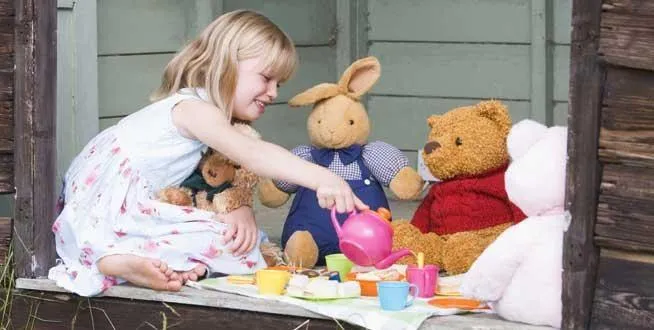
Benefits of play
The Power of Imaginary Play: How it Shapes Brain Development
Imaginary play, often referred to as pretend or make-believe play, is a cornerstone of childhood. It involves children creating imaginary worlds, characters, and scenarios, often using toys, costumes, and props to bring their fantasies to life. While it may seem like simple fun, imaginary play plays a profound role in shaping brain development in children. Here are several ways in which imaginary play contributes to cognitive, emotional, and social growth:
Enhanced Cognitive Skills: Imaginary play engages multiple cognitive processes, including imagination, memory, problem-solving, and creativity. When children create imaginary scenarios and storylines, they exercise their ability to think abstractly and flexibly. They must remember details about their imaginary world, such as the roles of different characters and the rules of the game they're playing. Inventing and resolving conflicts within their play scenarios also promote problem-solving skills and critical thinking. Moreover, imaginary play encourages creativity by allowing children to explore limitless possibilities and think outside the box, which stimulates brain development and fosters innovation.
Emotional Regulation and Empathy: Through imaginary play, children have the opportunity to explore and express a wide range of emotions in a safe and controlled environment. As they take on different roles and inhabit various characters, they learn to understand and empathize with others' perspectives. Pretend play allows children to experiment with social roles and relationships, helping them develop a deeper understanding of emotions and interpersonal dynamics. Additionally, imaginary play provides a platform for children to process and cope with real-life experiences and emotions, such as fear, anxiety, or excitement, fostering emotional resilience and regulation.
Social Skills and Communication: Imaginary play is inherently social, often involving cooperation, negotiation, and collaboration among children. As they engage in pretend scenarios with peers, children practice essential social skills, such as sharing, taking turns, and resolving conflicts peacefully. Through role-playing and interaction with imaginary characters, children develop their communication skills, including verbal and non-verbal cues, active listening, and expressive language. Imaginary play also encourages children to engage in complex narratives and storytelling, which strengthens their narrative comprehension and ability to convey ideas effectively.
Executive Functioning and Self-Regulation: Engaging in imaginary play requires children to exercise executive functions such as planning, organizing, and self-regulation. They must coordinate their actions, thoughts, and behaviors to maintain the coherence of their imaginary world and adhere to the rules of their play scenarios. Imaginary play also provides opportunities for children to practice impulse control, emotional regulation, and delaying gratification—skills that are essential for success in various aspects of life, including academics and social relationships.
Imaginary play is far more than just a form of entertainment for children—it's a powerful catalyst for brain development and holistic growth. By engaging in pretend scenarios, children exercise their cognitive, emotional, and social faculties, laying the foundation for lifelong learning, creativity, and resilience. As parents, educators, and caregivers, it's essential to recognize the value of imaginary play and create opportunities for children to immerse themselves in the rich and transformative world of make-believe. Through imaginative exploration and play, children not only expand their minds but also cultivate essential skills and capacities that will serve them well throughout their lives.
